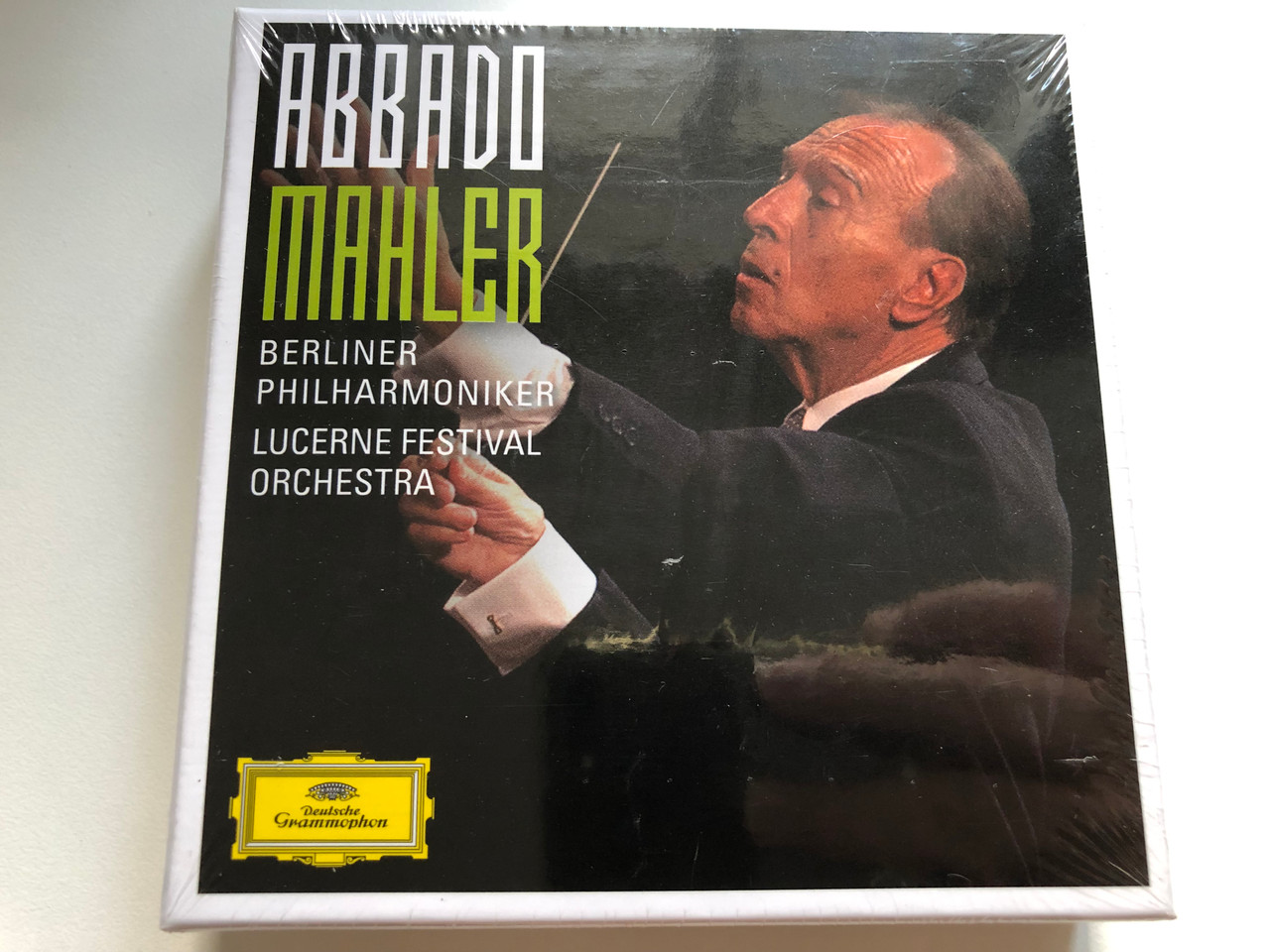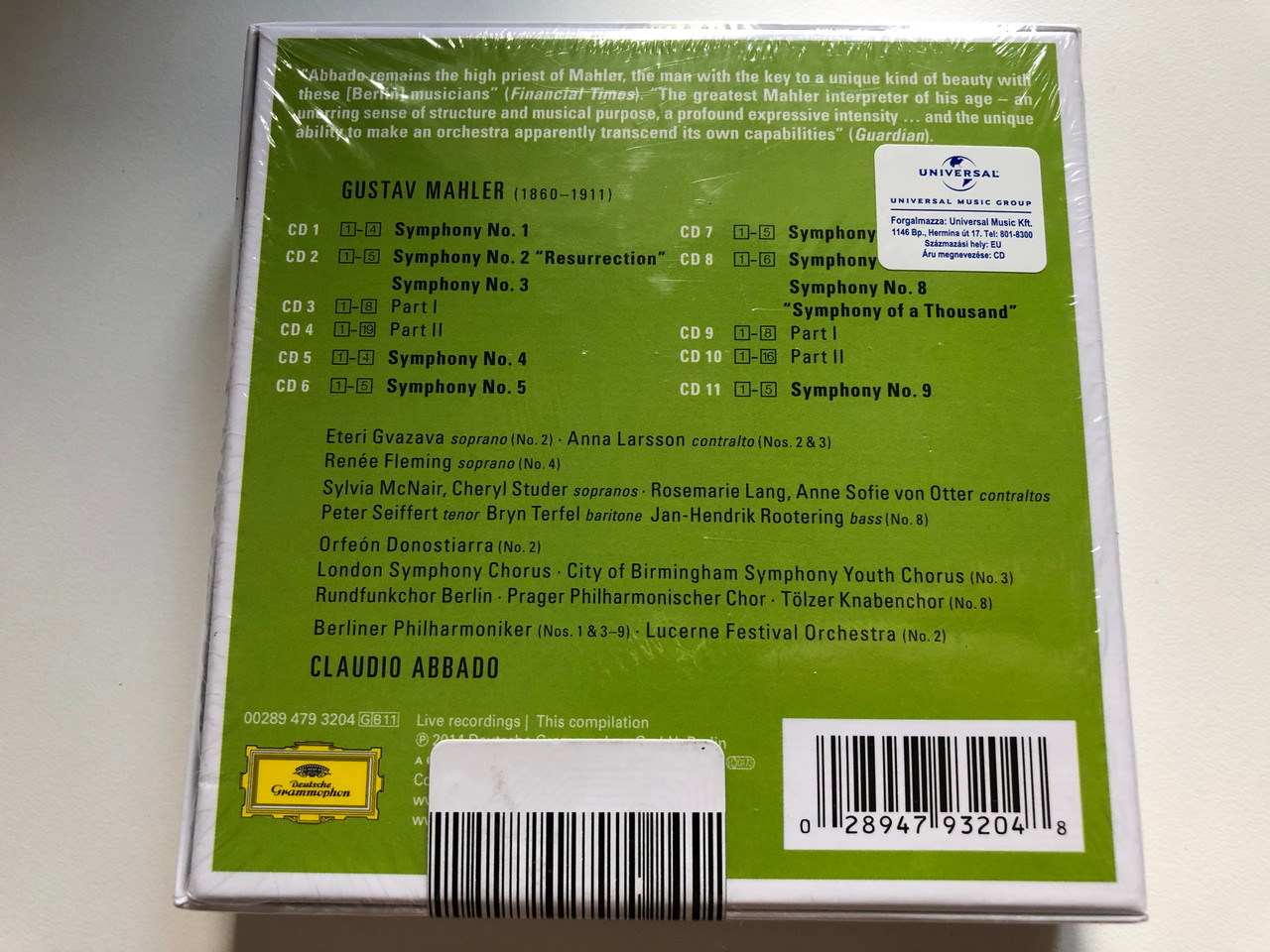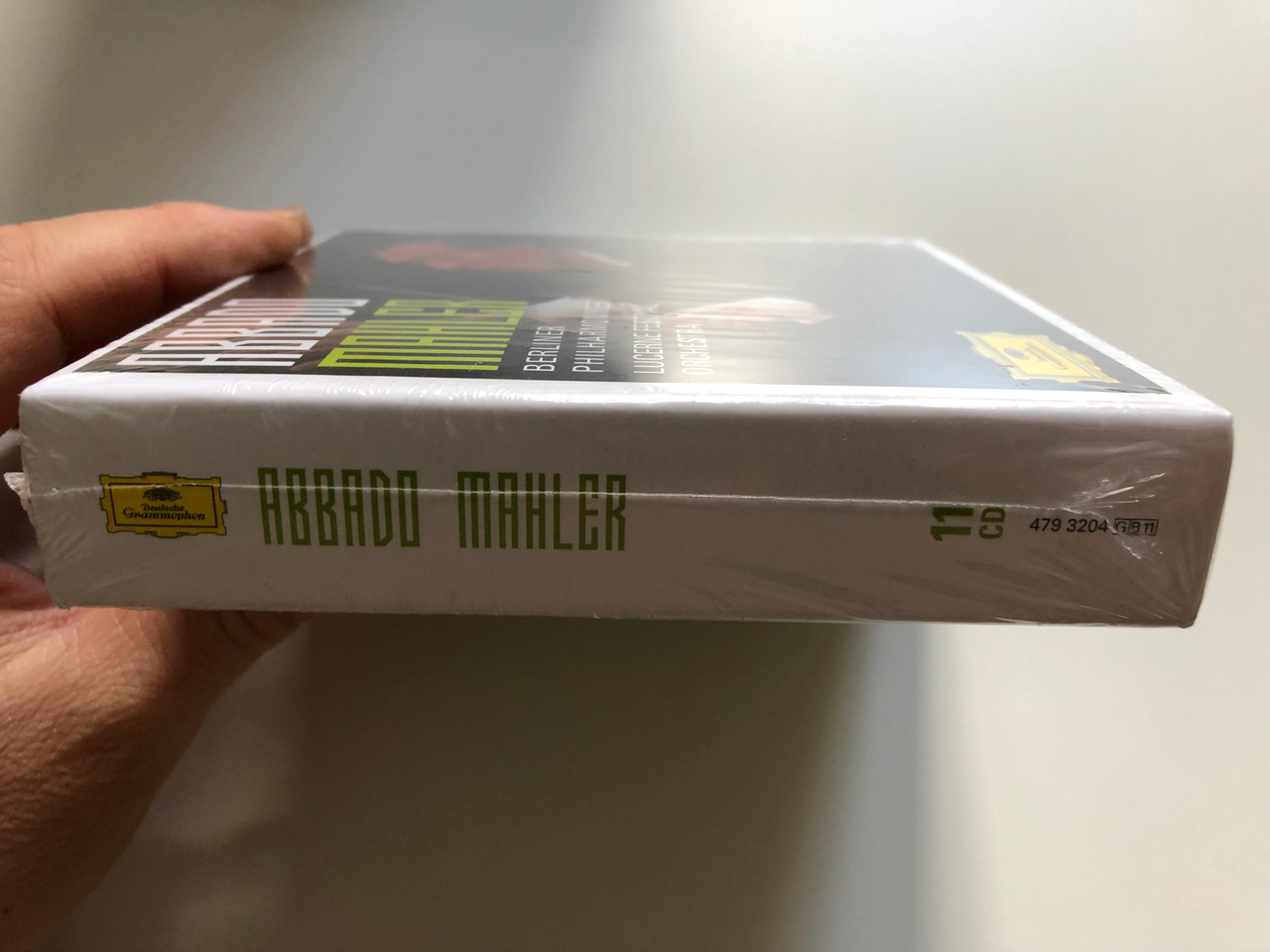Abbado - Mahler - Berliner Philharmoniker, Lucerne Festival Orchestra / Deutsche Grammophon 11x Audio CD, Box Set 2014 / 00289 479 3204
UPC 028947932048
Claudio Abbado OMRI (Italian pronunciation: [ˈklaudjo abˈbaːdo]; 26 June 1933 – 20 January 2014) was an Italian conductor who was one of the leading conductors of his generation. He served as music director of the La Scala opera house in Milan, principal conductor of the London Symphony Orchestra, principal guest conductor of the Chicago Symphony Orchestra, music director of the Vienna State Opera, founder and director of Lucerne Festival Orchestra, founder and director of Mahler Chamber Orchestra, founding Artistic Director of Orchestra Mozart, music director of European Union Youth Orchestra, and principal conductor of the Berlin Philharmonic orchestra.
Gustav Mahler (German: [ˈmaːlɐ]; 7 July 1860 – 18 May 1911) was an Austro-Bohemian Romantic composer, and one of the leading conductors of his generation. As a composer he acted as a bridge between the 19th-century Austro-German tradition and the modernism of the early 20th century. While in his lifetime his status as a conductor was established beyond question, his own music gained wide popularity only after periods of relative neglect, which included a ban on its performance in much of Europe during the Nazi era. After 1945 his compositions were rediscovered by a new generation of listeners; Mahler then became one of the most frequently performed and recorded of all composers, a position he has sustained into the 21st century. A 2016 BBC Music Magazine survey of 151 conductors ranked three of his symphonies in the top ten symphonies of all time.
| Label: |
Deutsche Grammophon – 00289 479 3204 |
|---|
| Format: |
11 x CD, Album, Box Set, Compilation
|
|---|
| Country: |
|
|---|
Released:
|
2014 |
|---|
| Genre: |
Classical |
|---|
| Style: |
Romantic |
|---|
Tracklist:
| |
|
Symphony No. 1 In D Major (Live Recording)
Orchestra – Berliner Philharmoniker
|
| 1-1 |
|
1. Langsam. Schleppend |
16:13 |
| |
| 1-2 |
|
2. Kräftig Bewegt, Doch Nicht Zu Schnell |
7:23 |
| |
| 1-3 |
|
3. Feierlich Und Gemessen, Ohne Zu Schleppen |
10:32 |
| |
| 1-4 |
|
4. Stürmisch Bewegt |
20:37 |
| |
|
Symphony No. 2 In C Minor "Resurrection" (Live Recording)
Chorus – Orfeón Donostiarra
Chorus Master – José Antonio Sainz Alfaro
Contralto Vocals – Anna Larsson (2)
Orchestra – Lucerne Festival Orchestra
Soprano Vocals – Eteri Gvazava
|
| 2-1 |
|
1. Allegro Maestoso (Totenfeier). Mit Durchaus Ernstem Und Feierlichem Ausdruck |
20:45 |
| |
| 2-2 |
|
2. Andante Moderato. Sehr Gemächlich |
9:23 |
| |
| 2-3 |
|
3. [Scherzo] In Ruhig Fließender Bewegung |
11:22 |
| |
| 2-4 |
|
4. "Urlicht". Sehr Feierlich, Aber Schlicht - "O Röschen Rot!" (Contralto Solo)
Text By [From] – Des Knaben Wunderhorn
|
| 2-5 |
|
5. Im Tempo Des Scherzo. Wild Herausfahrend. "Die Auferstehung" (Soprano Solo, Cobtralto Solo, Chorus)
Text By – Friedrich Gottlieb Klopstock
|
|
34:42
|
| |
|
Symphonie No. 3 In D Minor (Live Recording)
Chorus – City Of Birmingham Symphony Youth Chorus, London Symphony Chorus
Chorus Master [City Of Birmingham Symphony Youth Chorus] – Simon Halsey
Chorus Master [London Symphony Chorus] – Stephen Westrop
Contralto Vocals – Anna Larsson (2)
Horn [Post Horn] – Hans Gansch
Orchestra – Berliner Philharmoniker
Violin – Toru Yasunaga
|
| 3-1 |
|
Part I - 1. Kräftig. Entscheiden |
5:11 |
| |
| 3-2 |
|
Immer Das Gleiche Tempo (Fig. 11) |
3:43 |
| |
| 3-3 |
|
Tempo I (Fig. 18) |
4:50 |
| |
| 3-4 |
|
Zeit Lassen (Fig. 29) |
2:02 |
| |
| 3-5 |
|
Zeit Lassen (Fig. 33) |
4:11 |
| |
| 3-6 |
|
Immer Dasselbe Tempo. (Marsch.) (Fig. 43) |
3:26 |
| |
| 3-7 |
|
Im Alten Marschtempo (Allegro Moderato): 3 Takte Nach/bars After/mesures Après (Fig. 54) |
4:45 |
| |
| 3-8 |
|
Tempo I (Fig. 62) |
5:15 |
| |
| 4-1 |
|
Part II - 2. Tempo Di Minuetto. Sehr Mäßig |
1:57 |
| |
| 4-2 |
|
L'istesso Tempo (Fig. 3) |
0:59 |
| |
| 4-3 |
|
A Tempo. (Wie Im Anfang) (Fig. 6) |
3:34 |
| |
| 4-4 |
|
Ganz Plötzlich Gemachlich. Tempo Di Menuetto |
2:45 |
| |
| 4-5 |
|
3. Comodo. Scherzando. Ohne Hast |
2:29 |
| |
| 4-6 |
|
Wieder Sehr Gemächlich, Wie Zu Anfang (Fig. 6) |
2:52 |
| |
| 4-7 |
|
Etwas Suruckhaltend: 6 Takte Vor/before/avant (Fig. 14) |
4:26 |
| |
| 4-8 |
|
Tempo I: 2 Takte Vor (Fig. 17) |
2:49 |
| |
| 4-9 |
|
Wieder Sehr Gemäclich. Beinahe Langsam (Fig. 27) |
3:47 |
| |
| 4-10 |
|
4. Sehr Langsam. Misterioso: Durchaus Ppp "O Mensch! Gib Acht“ (Contralto Solo)
Text By – Friedrich Nietzsche
|
| 4-11 |
|
Più Mosso Subito: 6 Takte Nach (Fig. 6) |
4:18 |
| |
| 4-12 |
|
5. Lustig Im Tempo Und Keck Im Ausdruck: "Bimm Bamm. Es Sungen Drei Engel" (Chorus, Contralto Solo)
Text By [From] – Des Knaben Wunderhorn
|
| 4-13 |
|
6. Langsam. Ruhevoll. Empfunden |
3:18 |
| |
| 4-14 |
|
Nicht Mehr So Breit (Fig. 6) |
3:08 |
| |
| 4-15 |
|
Tempo I. Ruhevoll |
2:51 |
| |
| 4-16 |
|
Nicht Mehr So Breit (Fig. 13) |
4:00 |
| |
| 4-17 |
|
Tempo I (Fig. 21) |
2:42 |
| |
| 4-18 |
|
Langsam. Tempo I (Fig. 25) |
6:29 |
| |
| 4-19 |
|
[Applause] |
3:20 |
| |
|
Symphony No. 4 In G Major (Live Recording)
Orchestra – Berliner Philharmoniker
Soprano Vocals – Renée Fleming
|
| 5-1 |
|
1. Bedächtig. Nicht Eilen - Recht Gemächlich |
16:13 |
| |
| 5-2 |
|
2. In Gemächlicher Bewegung. Ohne Hast |
9:35 |
| |
| 5-3 |
|
3. Ruhevoll (Poco Adagio) |
19:57 |
| |
| 5-4 |
|
4. Sehr Behaglic. "Wir Genießen Die Himmlischen Freuden" |
9:25 |
| |
|
Symphony No. 5 In C Sharp Minor (Live Recording)
Horn – Gerd Seifert
Orchestra – Berliner Philharmoniker
|
| 6-1 |
|
Part I - 1. Trauermarsch (In Gemessenem Schritt. Streng. Wie Ein Kondukt |
12:36 |
| |
| 6-2 |
|
Part I - 2. Stürmisch Bewegt. Mit Größter Vehemenz |
14:46 |
| |
| 6-3 |
|
Part II - 3. Scherzo. Kräftig, Nicht Zu Schnell |
17:26 |
| |
| 6-4 |
|
Part III - 4. Adagietto. Sehr Langsam |
9:01 |
| |
| 6-5 |
|
Part III - 5. Rondo-Finale. Allegro - Allegro Giocoso. Frisch |
15:40 |
| |
|
Symphony No. 6 In A Minor (Live Recording)
Orchestra – Berliner Philharmoniker
|
| 7-1 |
|
1. Allegro Energico, Ma Non Troppo. Heftig Aber Markig |
22:48 |
| |
| 7-2 |
|
2. Andante Moderato |
13:57 |
| |
| 7-3 |
|
3. Scherzo. Wuchtig |
12:43 |
| |
| 7-4 |
|
4. Finale. Allegro Moderato - Allegro Energico |
29:44 |
| |
| 7-5 |
|
[Applause] |
0:24 |
| |
|
Symphony No. 7 In E Minor (Live Recording)
Orchestra – Berliner Philharmoniker
|
| 8-1 |
|
1. Langsam (Adagio) - Allegro Risoluto, Ma Non Troppo |
21:35 |
| |
| 8-2 |
|
2. Nachtmusik. Allegro Moderato |
15:54 |
| |
| 8-3 |
|
3. Scherzo. Schattenhaft. |
8:53 |
| |
| 8-4 |
|
4. Nachtmusik. Andante Amoroso |
12:58 |
| |
| 8-5 |
|
5. Rondo-Finale. Allegro Ordinario - Allegro Moderato Ma Energico |
17:45 |
| |
| 8-6 |
|
[Applause] |
1:02 |
| |
|
Symphony No. 8 "Symphony Of A Thousand" (Live Recording)
Baritone Vocals [Pater Ecstaticus] – Bryn Terfel
Bass Vocals [Pater Profundus] – Jan-Hendrik Rootering
Choir [Boy's Choir] – Tölzer Knabenchor
Chorus Master [Prager Philharmonicher Chror] – Pavel Kühn
Chorus Master [Rundfunkchor Berlin] – Dietrich Knothe
Chorus Master [Tölzer Knabenchor] – Gerhard Schmidt-Gaden
Chorus [II] – Prager Philharmonicher Chor
Chorus [I] – Rundfunkchor Berlin
Contralto Vocals [II] [Maria Aegyptiaca] – Rosemarie Lang
Contralto Vocals [I] [Mulier Samaritana] – Anne Sofie Von Otter
Orchestra – Berliner Philharmoniker
Soprano Vocals [II] [Magna Peccatrix] – Sylvia McNair
Soprano Vocals [I] [Una Poenitentium] – Cheryl Studer
Soprano Vocals [Mater Gloriosa] – Andrea Rost
Tenor Vocals [Doctor Marianus] – Peter Seiffert
Text By – Johann Wolfgang von Goethe
|
| 9-1 |
|
Part I - Hymnus "Veni, Creator Spiritus" - Allegro Impetuoso."Veni Creator Spiritus" (Chorus I/II) |
1:33 |
| |
| 9-2 |
|
Part I - Hymnus "Veni, Creator Spiritus" - A Tempo. Etwas (Aber Unmerklich) Gemäßigter; Immer Sehr Fließend. "Imple Superna Gratia" (Soprano I, Tenor, Soprano II, Contralto I/II, Baritone, Bass; Chorus I/II) |
3:35 |
| |
| 9-3 |
|
Part I - Hymnus "Veni, Creator Spiritus" - Etwas Drängend - Noch Einmal Sehr Langsam Als Vorher (Nicht Scleppend). "Infirma Nostri Corporis" (Chorus II/I; Soprano I/II, Contralto I/II, Tenor, Bass, Baritone) |
2:10 |
| |
| 9-4 |
|
Part I - Hymnus "Veni, Creator Spiritus" - Tempo I. (Allegro, Etwas Hastig) |
1:18 |
| |
| 9-5 |
|
Part I - Hymnus "Veni, Creator Spiritus" - Sehr Fließend - Noch Einmal Sehr Langsam Als Vorher. Nicht Scleppend. "Infirma Nostri Corporis" (Bass, Tenor, Contralto I/II, baritone, Soprano I/II) |
2:45 |
| |
| 9-6 |
|
Part I - Hymnus "Veni, Creator Spiritus" - Plötzlich Sehr Breit Und Leidenschaftlischen Ausdrucks - Mit Plötzlichem Aufschwung. "Accende Lumen Sensibus" (Soprano I/II, Contralto I/II, Tenor, Baritone, Bass; Boys' Choir, Chorus I/II) |
4:54 |
| |
| 9-7 |
|
Part I - Hymnus "Veni, Creator Spiritus" - "Veni, Creator Spritus...Da Gaudiorum Praemia" (Soprano I/II, Contralto I/II, Tenor, Baritone, Bass; Chorus I/II, Boys' Choir) |
4:13 |
| |
| 9-8 |
|
Part I - Hymnus "Veni, Creator Spiritus" - Wieder Frisch. "Gloria Sit Patri Domino" (Boys' Choir, Soprano I/II, Contralto I/II, Tenor; Chorus I/II; Baritone, Bass) |
2:57 |
| |
| 10-1 |
|
Part II - Final Scene From Goethe's Faust II - Poco Adagio |
6:50 |
| |
| 10-2 |
|
Part II - Final Scene From Goethe's Faust II - Più Mosso (Allegro Moderato) |
3:15 |
| |
| 10-3 |
|
Part II - Final Scene From Goethe's Faust II - Wieder Langsam. Chor Und Echo: "Waldung, Sie Schwankt Heran" (Chorus I/II) |
4:47 |
| |
| 10-4 |
|
Part II - Final Scene From Goethe's Faust II - Moderato. Pater Ecstaticus: "Ewiger Wonnebrand" (Baritone) |
1:53 |
| |
| 10-5 |
|
Part II - Final Scene From Goethe's Faust II - Allegro (Allegro Apposionato). Pater Profundus: "Wie Felsenabgrund Mir Zu Füßen" (Bass) |
4:42 |
| |
| 10-6 |
|
Part II - Final Scene From Goethe's Faust II - Allegro Deciso. (Im Anfang Noch Nicht Eilien); Chor Der Engel: "Gerettet Ist Das Edle Glied Des Geisterwelt Vom Bösen" - Chor Seliger Knabel: "Hände Verschlinget Euch" (Chorus I/II: Soprano, Contralto, Boys' Choir) |
1:03 |
| |
| 10-7 |
|
Part II - Final Scene From Goethe's Faust II - Molto Leggiero. Chor Der Jungeren Engel: "Jene Rosen, Aus Den Händen" (ChorusI: Soprano, Contralto) |
1:53 |
| |
| 10-8 |
|
Part II - Final Scene From Goethe's Faust II - Schon Etwas Langsamer Und Immer Noch Mäßiger - Wie Die Gleiche Stelle Im I. Teil: Die Vollendeteren Engel: "Uns Bleibt Ein Erdenrest" (Chorus II: Soprano, Contralto, Tenor, Contralto Solo) |
2:04 |
| |
| 10-9 |
|
Part II - Final Scene From Goethe's Faust II - Im Anfang (Die Ersten Vier Takte) Noch Etwas Gehalten. Die Jungeren Engel: "Ich Spür' Soeben, Nebelnd Um Felsenhöh’" - Doctor Marianus: "Hier Ist Die Aussicht Wir" - Chor Seliger Knaben: "Freudig Empfangen Wir" (ChorusI: Soprano, Contralto, Tenor; Boys' Choir) |
1:19 |
| |
| 10-10 |
|
Part II - Final Scene From Goethe's Faust II - Sempre L'istesso Tempo. Doctor Marianus: "Höchste Herrscherin Der Welt" (Tenor; Chorus I/II) |
4:02 |
| |
| 10-11 |
|
Part II - Final Scene From Goethe's Faust II - Äußerst Langsam. Adagissimo "Dir, Der Unberührbaren" (Chorus II/I) - Chor Der Bußerinnen Und Una Poenitentium: "Du Schwebst Zu Höhen Der Ewigen Reiche" (Chorus II; Soprano I) |
3:53 |
| |
| 10-12 |
|
Part II - Final Scene From Goethe's Faust II - Fließend. Magna Peccatrix: "Bei Der Liebe, Die Den Füßen" - Mulier Samaritana: "Bei Dem Bronn, Zu Dem Schon Weiland" - Maria Aegyptiaca: Bei Dem Hochgeweihten Orte" (Soprano II, Contralto I, Contralto II) |
4:57 |
| |
| 10-13 |
|
Part II - Final Scene From Goethe's Faust II - Una Poenitentium: "Neige, Neige, Du Ohnegleiche" (Soprano I) |
0:54 |
| |
| 10-14 |
|
Unmerklich Frischer Werden. Seligen Knaben: "Er Überwächst Uns Schon" - Una Poenitentium: "Vom Edlen Geisterchor Umgeben" (Boys' Choir; Tenor; Chrus II/I, Boys' Choir) |
3:24 |
| |
| 10-15 |
|
Part II - Final Scene From Goethe's Faust II - Sehr Langsam. Mater Gloriosa: "Komm! Hebe Dich Zu Höhern Sphären" - Hymnenartig, Doctor Marianus: "Blicket Auf Zum Retterblick" (Soprano, Tenor, Chorus II/I, Boys' Choir) |
7:16 |
| |
| 10-16 |
|
Part II - Final Scene From Goethe's Faust II - Sehr Langsam Beginnend. Chorus Mysticus: "Alles Vergängliche Ist Nur Ein Gleichnis"(Soprano I/II; Soprano I/IUI, Contralto I/II, Tenor, Baritone, Bass; Boys' Choir) |
5:43 |
| |
|
Symphony No. 9 In D Major (Live Recording)
Orchestra – Berliner Philharmoniker
|
| 11-1 |
|
1. Andante Comodo |
25:52 |
| |
| 11-2 |
|
2. Im Tempo Eines Gemächlichen Ländlers.Etwas Täppisch Und Sehr Derb |
14:56 |
| |
| 11-3 |
|
3. Rondo-Burleske. Allegro Assai. Sehr Trotzig |
12:21 |
| |
| 11-4 |
|
4. Adagio. Sehr Langsam Und Noch Zurückhaltend |
25:56 |
| |
- Composed By – Gustav Mahler
- Conductor – Claudio Abbado





























